In the ever-evolving world of digital finance, the stakes are high; crypto thefts and wallet exploits have cost investors a total of $2.2 billion globally in the first half of 2025. A single vulnerability, be it poor encryption or unsupported networks, can lead to irreversible financial loss. In the UK, the ecosystem of crypto wallets is broad but fragmented. With stablecoins like USDT increasingly used for trading, payments, and storing value, users must remain vigilant and informed when choosing where to store their funds. However, numerous platforms support Bitcoin or Ethereum, but not all are optimised for USDT, especially across its multiple networks such as ERC-20, TRC-20, and BEP-20. Many wallets available to UK users either offer limited network compatibility or clunky user interfaces that frustrate rather than empower. The demand for efficient USDT wallet solutions is growing due to the surge in cross-border transactions, active trading, and more focus on stability, speed, and utility.
We've carefully researched and reviewed a shortlist of the most secure, efficient, and best USDT wallets in the UK, with a special focus on platforms that support multiple USDT networks and provide seamless integration with UK-based exchanges. Expect a detailed breakdown of each wallet’s features, strengths, potential limitations, and why it made our list.
Table of Contents
How to Choose the Right Tether Wallet in the UK?
- Security Features.
- Network Compatibility.
- Integration with UK Exchanges.
- User Interface and Experience.
- Transaction Fees.
- Cross-Platform Access.
Top 7 USDT wallets for UK-based users
Ledger Flex
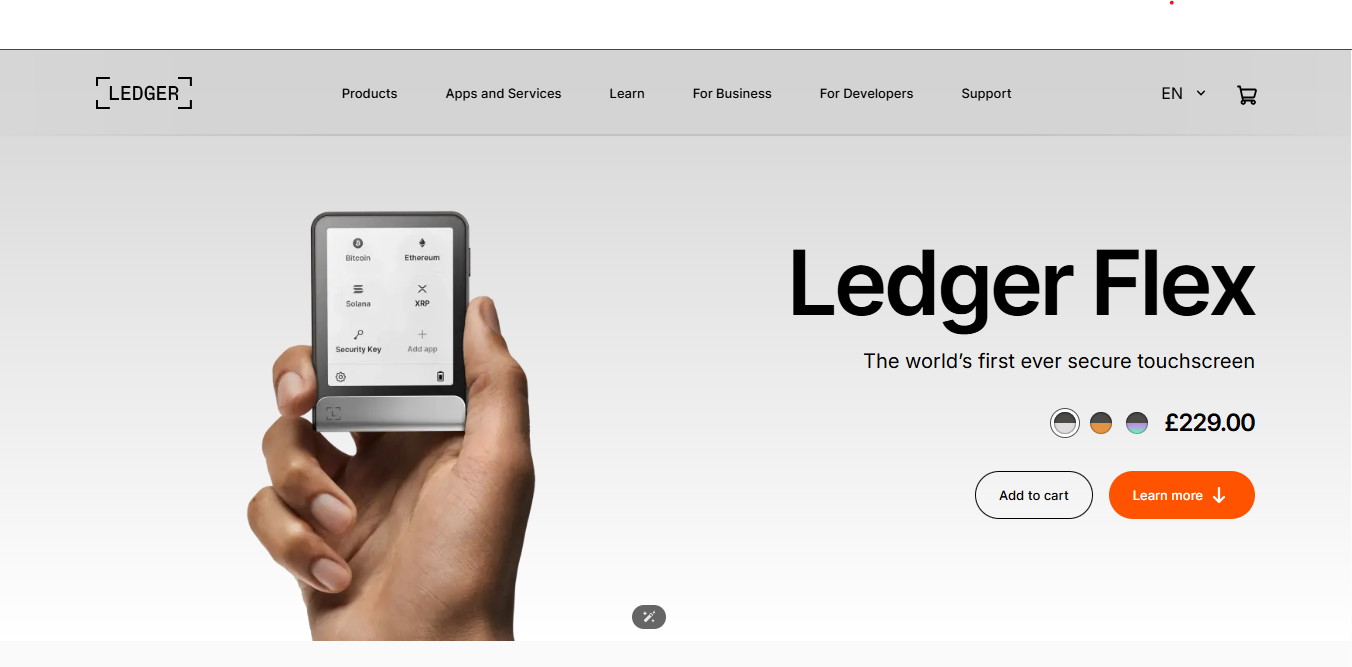
Ledger Flex is a premium cold wallet solution developed by Ledger, tailored for users who prioritise top-tier security and reliable asset storage. It is widely recognised for its secure hardware-based infrastructure that keeps USDT and other digital assets completely offline, minimising exposure to online threats. The wallet’s secure element chip, CC EAL5+ certified, and integration with Ledger Live software ensure robust transaction authentication and seamless asset management from a single interface.
Pros
- Hardware-based cold storage offering maximum offline security.
- Multiple USDT networks (ERC-20, TRC-20, BEP-20).
- Customisable transaction fees and manual verification for added control.
- Compatible with desktop and mobile platforms via Bluetooth or USB.
Cons
- Physical device purchase, which may not suit casual users.
- Beginners need time to understand the security setup and recovery protocols.
Best For
Ledger Flex is best suited for UK-based users who prioritise asset security above all, especially long-term USDT holders, high-volume traders, and freelancers seeking offline protection for large payments.
Trust Wallet
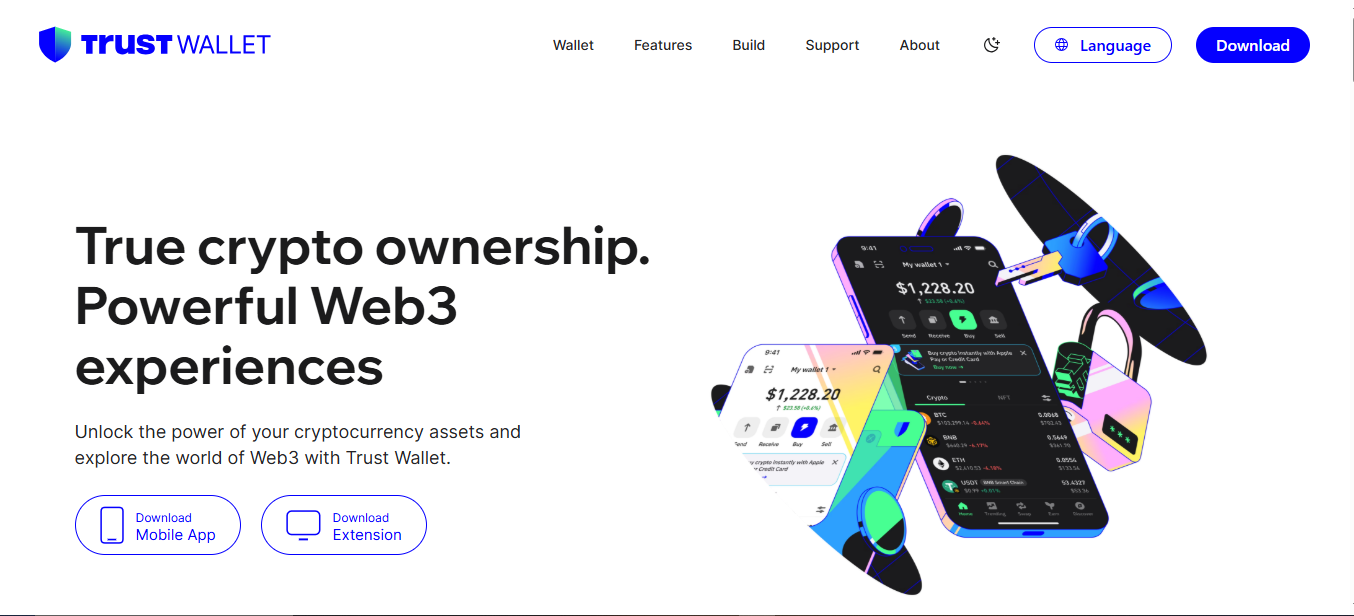
Trust Wallet is a widely recognised non-custodial crypto wallet known for its support for multiple USDT networks, including ERC-20, TRC-20, and BEP-20, allowing users to transfer Tether across a range of platforms with speed and efficiency. Its private key storage on users’ devices and backup seed phrase options offer a high level of security suitable for both active traders and long-term holders. The wallet charges no fees for basic usage, and transaction costs are strictly network-determined, making it a cost-effective option for those operating within fee-sensitive trading strategies.
Pros
- Integrated DApp browser and staking features for advanced users.
- Strong mobile security features, including biometrics and encrypted storage.
- User-friendly interface suitable for beginners and experienced traders alike.
Cons
- Lacks a dedicated desktop version, limiting access to mobile devices only.
- No direct integration with UK-based fiat on-ramp services.
Best For
Trust Wallet is especially suitable for traders and freelancers who need a secure, low-fee, and flexible wallet without relying on centralised exchanges.
MetaMask

Originally designed for Ethereum-based tokens, Metamask now supports multiple USDT-compatible networks such as ERC-20, BNB Smart Chain, and Polygon through custom RPC configuration, making it an adaptable option for traders and investors. While MetaMask does not charge wallet usage fees, users will need to pay standard network fees, which vary depending on the selected blockchain. Its intuitive interface, real-time network switching, and integration with platforms like Uniswap and OpenSea contribute to a highly user-friendly experience for both experienced traders and crypto newcomers in the UK.
Pros
- Wide range of dApps, DEXs, and DeFi platforms integration.
- Browser extension and mobile app for cross-platform access.
- Secure storage with hardware wallet compatibility, private key control, and encrypted seed phrases.
Cons
- No support for native Bitcoin or USDT on TRC-20 (Tron network)
- Manual network configuration for some chains.
Best for:
MetaMask is best suited for UK-based users who actively interact with decentralised applications or engage in multi-network USDT trading and DeFi activities.
Trezor Model T
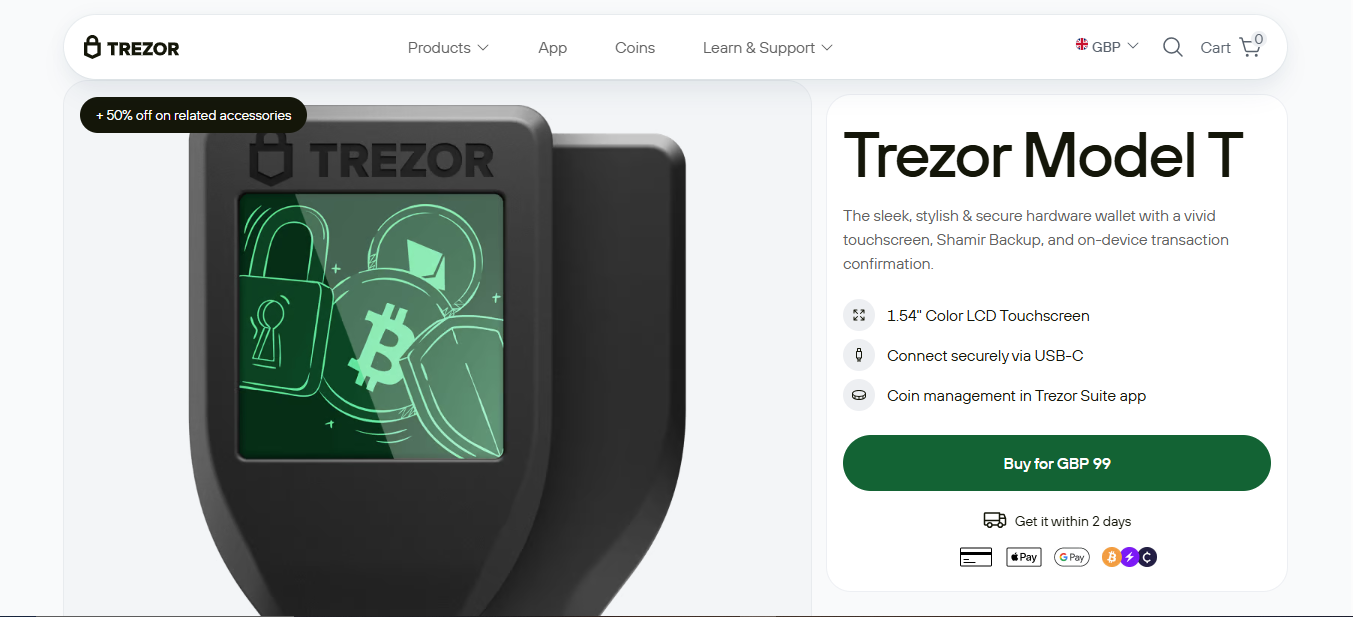
Trezor Model T is a top-tier hardware wallet renowned for its high-level security features and comprehensive offline storage capabilities, making it one of the top Tether wallets in the UK. As a second-generation device from SatoshiLabs, it offers advanced protection through secure offline key storage and password management. While transaction times depend on network conditions rather than the device itself, users benefit from streamlined signing and broadcasting processes.
Pros
- ERC-20 tokens support, including USDT, with compatibility across multiple blockchain networks.
- Full-color touchscreen for easier transaction verification.
- Trezor Suite integration for desktop-based portfolio management, with added passphrase protection.
Cons
- Relatively high upfront cost compared to software wallets.
- No in-built exchange or swap feature within the device itself.
Best For
Trezor Model T is ideal for individuals who are looking for a reliable, tamper-resistant device that supports secure crypto management without depending on third-party platforms.
Omni Wallet
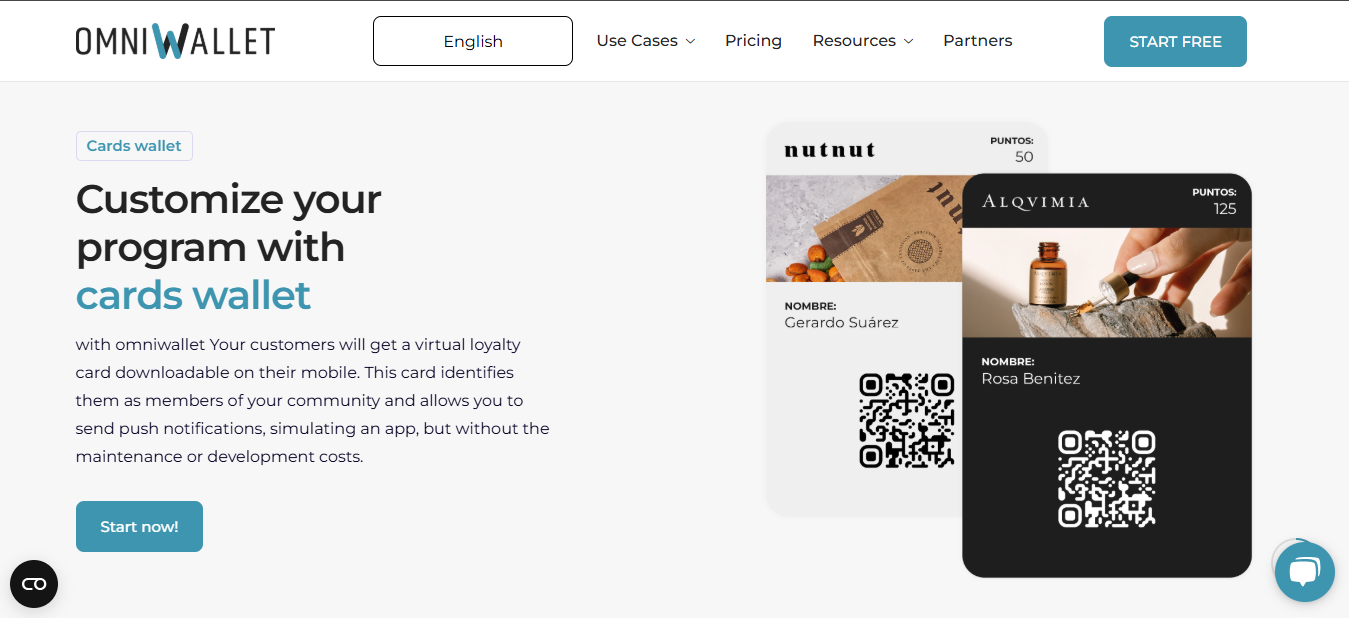
Omni Wallet is a well-established digital asset wallet designed specifically to support tokens issued on the Bitcoin blockchain, including early versions of USDT (Omni Layer). Despite being older than many newer wallets, Omni Wallet remains a relevant choice in the UK due to its strong encryption standards, minimal reliance on third-party services, and support for legacy USDT protocols. Transactions are processed through the Bitcoin network, which enhances security but may result in longer confirmation times and variable network fees.
Pros
- USDT support on the Bitcoin-based Omni Layer, which is rare among modern wallets.
- Open-source and decentralised, offering users full control and transparency.
- No custodial restrictions or third-party involvement.
- Accessible via a web-based interface with multi-device compatibility.
Cons
- Slower transaction speeds due to reliance on the Bitcoin blockchain.
- Lacks built-in integration with UK exchanges or modern DeFi tools.
Best For
Omni Wallet is best for users who prioritise long-term USDT storage and manage legacy USDT assets or seek to store funds outside of centralised platforms.
Exodus
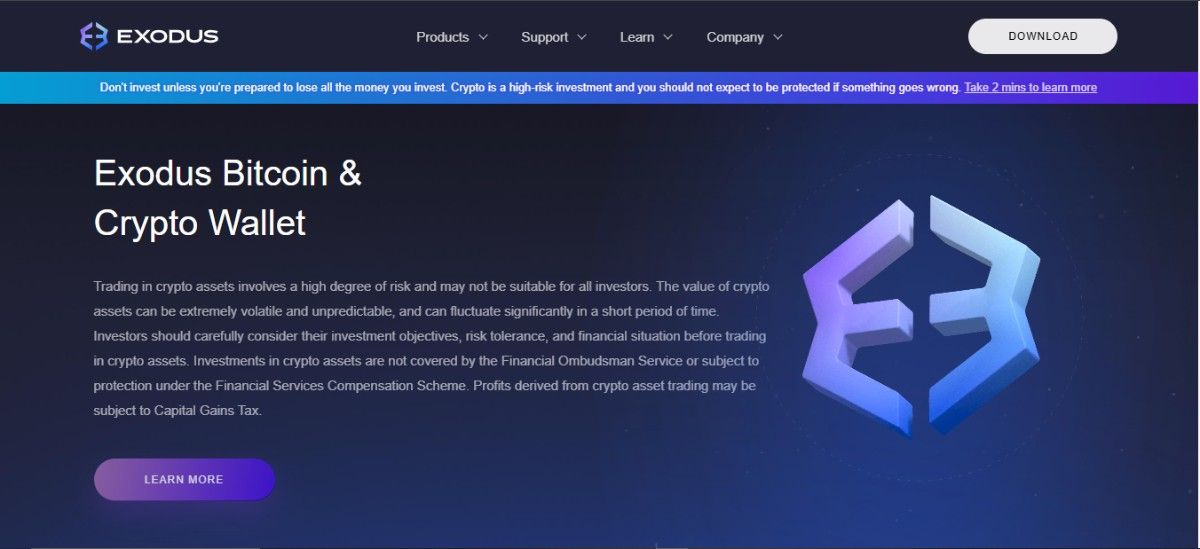
Exodus is a multi-asset, non-custodial wallet known for offering seamless access to USDT across multiple networks, including ERC-20 and TRC-20. Security-wise, Exodus uses local encryption, device-level storage, and password protection to keep user data and private keys secure. There are no additional wallet fees on transactions beyond the network fee, and most transfers are processed within minutes, subject to network congestion.
Pros
- Highly intuitive and beginner-friendly interface.
- Built-in exchange functionality for easy asset swaps.
- Compatible with both desktop and mobile platforms.
- Real-time portfolio tracking and performance analytics.
Cons
- No native two-factor authentication.
- Private key recovery requires manual backup, which may confuse beginners
- Not regulated by any UK financial authority
Best For
Exodus is best for beginners and traders who prioritise fast access to their funds, self-custody, and real-time tracking without sacrificing usability.
Coinomi
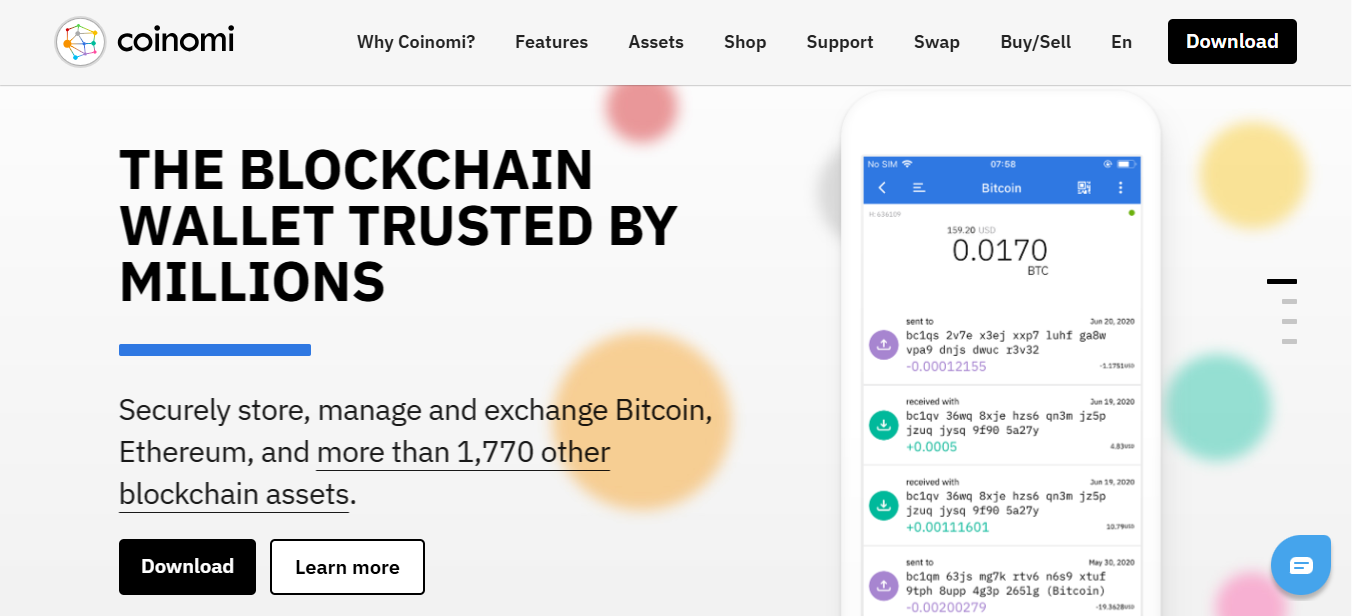
Coinomi is a long-established, multi-asset crypto wallet known as one of the few wallets with native support for ERC-20, TRC-20, and BEP-20 versions of Tether. The wallet operates with no identity verification requirement, preserving user anonymity while still delivering full control over private keys. Security features include advanced encryption, and it has no history of security breaches since its launch in 2014. It supports over 1,700 assets and direct integration with decentralised exchanges (DEXs).
Pros
- Built-in exchange functionality for quick swaps between assets.
- No internal fees; only standard blockchain network fees apply.
- Multi-language support and a user-friendly interface for global accessibility.
Cons
- No native fiat on-ramp or off-ramp features.
- Lacks two-factor authentication (2FA).
Best For
Coinomi is suitable for privacy-focused users and multi-network USDT holders in the UK who prioritise fast, anonymous, and flexible transactions across various blockchain networks.
FAQs
What is the Best Wallet for Storing USDT in the UK?
For users prioritising maximum asset protection and offline storage, Ledger Flex stands out as the best wallet for storing USDT in the UK. It offers unmatched security, broad network support, and functionality tailored to wallets designed to store Tether securely.
Can I Store Multiple USDT Types in One Wallet?
Users can store multiple types of USDT in a single wallet, provided the platform supports all these networks. Wallets like Trust Wallet, Coinomi, and Exodus are designed to manage various USDT standards simultaneously, allowing users to switch between networks as needed. This multi-network support ensures efficient management, especially for those engaging in trading or cross-platform transfers.
What USDT Wallet is the Safest from Hackers?
The Ledger Flex stands out as the safest from hackers due to its offline, hardware-based architecture and certified secure chip. This isolates private keys from internet exposure, making it one of the most trusted wallets to safely store Tether.
Are there any UK Restrictions on Tether Wallets?
There are currently no specific UK regulatory restrictions targeting Tether wallets directly; however, all crypto service providers, including wallet platforms, must comply with the Financial Conduct Authority’s (FCA) anti-money laundering (AML) and know-your-customer (KYC) requirements to operate legally within the jurisdiction.
Conclusion
Choosing the right wallets for USDT is essential for safeguarding digital assets and maintaining financial flexibility. UK crypto holders must assess each wallet's security measures, network support, and practical usability with care. A well-chosen wallet offers not just protection, but long-term confidence and efficiency in managing Tether across varied use cases, from trading to payments and storage.





 usdt
usdt xrp
xrp

